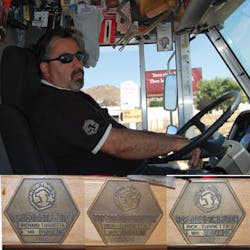It’s no secret that the economy is down. Even former Federal Reserve Chairman Alan Greenspan said this is “the type of wrenching financial crisis that comes along only once in a century.” In the east county area of San Diego, Matco Tools distributor Rick Turrietta knows that many of his shops are hurting.
In the Lakeside, El Cajon and Santee areas of San Diego County, he can point to several areas where a former good stop is now closed up or a shop that has laid off several techs over the past year.
“You used to be able to fall out of bed in the afternoon and make 10 grand a week,” Rick said. “Now, you have to put in more effort.”
Rick said in this economy a good distributor needs to know his different types of customers. Rick sees different types of customers in the way they buy and, more importantly, pay.
“As a tool guy, just knowing what’s on your customer’s mind, and how they pay is beneficial to you,” Rick said. “If you’ve got a guy that gets paid every two weeks, and it’s easier for him … set him up to pay every two weeks.
“Smart tool guys know when their customer’s get paid, how they get paid” and distributors need to be able to adjust to that, which is part of building loyalty.
“Hopefully you’ve already built in some of the loyalty you need, so they will continue to buy from you and not the competition,” Rick said of the poor economy’s effects on techs buying less. “I’ve found that … if you take care of your techs they’ll take care of you, for the most part.”
One key point to avoiding a lull is to build a good accounts receivable through as many techs as you can, Rick said. You don’t want to get too deep into just a few people. If you spread yourself out among 300-400 guys who each owe you a little bit, “You’ll be able to withstand the slow times a lot easier.”
For Rick, part of building the customer base and required loyalty is getting techs on the truck so you can build the relationship.
“One of the big things to keep bringing guys out to the truck is to make sure you have new things, different things. … Product is a big one, when it comes to bringing guys on the truck.
“You also want to run contests every now and then,” Rick said. “I have one I’ll be starting up next week, where a guy has to fill out a credit application, and gets a free Matco T-shirt. This helps me get some more business out of it, because now the guy may have credit from Matco that he didn’t know he had, or didn’t think he had.”
Other contests Rick runs include a Christmastime raffle based on payments.
“Over a six-week period, starting in the first week of November … whatever their average is, whether it be $25, $50 or $100, they will draw a prize out of one of three boxes. I typically have Christmas gift bags … it could be sunglasses, gloves, a flashlight. Even a jacket or a T-shirt.
“It’s hard for me to reward everyone the same, when you have some customers that are clearly better customers.,” Rick said. Thus the three different levels of rewards in the different boxes.
“I’ve probably spent $3,000, maybe a little more. But, my customer’s love it. They look forward to it every year, and it keeps the business going through the holidays.”
And, of course, he still gives customers a “regular” gift — a calendar and a pocket screwdriver.
HIS ROUTE
Rick splits his time “fairly evenly” between different repair shops, from heavy duty and motorcycle shops to performance shops, body shops and independent repair shops. He has roughly 400 customers that keep him buying about $350,000 every year in tools.
Rick’s been with Matco for six years, following five years at another tool company and previous route sales experience with Arrowhead Springs water delivery. He feels that the water route was a big help in learning the ropes of route-specific sales calls. And it was his time as an “employee distributor” at the other tool company that helped him realize he really liked having a tool route, and gave him the opportunity to learn the business, while not completely at his own expense.
Rick said his time on route sales was much more important to his success than tool knowledge itself.
“A lot of guys get into the business that were wrenchers, wrenched their whole life, and they feel [tool sales] are something they would be good at,” Rick said. “I think what’s more important than knowing tools is knowing how to deal with people, how to interact with them — how to put your customers in a situation where they don’t feel pressured. …
“You’re seeing the same guys week in and week out, and if you’re pressuring them to buy something, or you’re pressuring them to make a payment, eventually you’re going to lose them. Guys love to buy tools, they hate to be sold.
“For me, [customer interaction] is more important than knowing about tools, because I knew very little about tools before I got into the business. … I have no mechanical knowledge whatsoever, other than what I’ve learned on the job.
“If you have the tool knowledge, and the knowledge of how to run a business, and the knowledge of how to deal with people, these are the three things you have to have, or acquire to some degree, to make it work. But, if you don’t know a lot about tools, and guys like you, they’ll still buy from you. They’ll tell you what they want. … A lot of guys, they want you to look at them as the expert,” Rick said.
“It’s just a matter of treating the guys you’re dealing with the same way you would want to be treated.”
One of the things to keep his sales low-pressure is not jumping out of the truck immediately at each stop.
“I’ll give my customers a few minutes — I don’t want to just jump off the truck and jump out. A lot of times, that’s threatening. Give them a few minutes and give them a chance to make their way out.
“And it gives you time where you can wipe down the truck, make a phone call. ... There’s always something you could be doing.”
One thing Rick does to ensure his techs will come out to the truck without having to go in and “round them up” is to keep candy available. “And not the cheap stuff,” he said.
“It’s such a minimal expense, and an easy way to make sure guys are getting on the truck.”
It’s not just candy that Rick feels is important to stay away from the cheaper stuff. He thinks the same of his tools as well, including personal gear — like knives and sunglasses.
“You don’t want to carry cheap knives. The reason being, to me, it’s about perception; if you are carrying cheap anything, you’re perceived as the guy who has cheap tools. If you carry all quality stuff — you might not sell as many, but your perceived image is increased.”
At the very least, he concedes, if you do carry $20 knives, sunglasses or whatever, be sure to offer a top-shelf option as well.
“As long as you have them both, that’s fine.”
One area Rick would like to improve is in toolboxes, but not at the expense of regular tool sales.
“Toolboxes, unfortunately, are not a big part of my business,” Rick said. “I wish they were … every now and then, if you talk it up a little bit and you target the young guys, there are ways you can sell boxes. … The trick is to find the right sized one where you can sell them the tools too.
“You want to stay in their back pocket as long as possible.” And if you can sell them just the right toolbox, not too much, you get the advantage of being able to keep up tool sales with that customer — potentially to the exclusion of your competitors. Once the tech has the toolbox payment with you, he’ll be more likely to buy tools from you to manage just the one account instead of more on the other tool trucks as well.
Before a new customer hears about tools, toolboxes or anything else on Rick’s truck, he’s sure to inform them about the tool side of the repair business and check them out with others in the shop.
“What I like to do with all new guys, is make sure they know how the tool business works, and how they can set up two different types of accounts, corporate account and truck account. Once we’ve established that, I like to find out who they’ve dealt with in the past. If they’re totally new to the business, it becomes a complete crap shoot. I’ll talk to the other guys in the shop, the service manager, the owner: ‘How’s this guy working out for you?’ ‘How does he look?’ ‘Is he going to be around?’ ”
“And they’ll tell you, you’ll get all the information you need from them,” Rick said.
It’s always important to talk to the shop owners about the new guys. And keeping a regular dialogue going with the shop owners is never a bad idea.
“If the owner’s around, I definitely like to at least say ‘Hi,’ see if they have any needs,” Rick said. “Owners write the biggest checks, typically, and very seldom do their accounts go bad. They don’t pick up and leave and you never hear from them again.”
It’s really essential to talk to everyone at the shop, said Rick. That’s how you strengthen customer ties, and stay abreast of what’s going on. And maybe get a big equipment score from the owner.
And if you want to recession-proof your sales business, trying out some of Rick’s tips wouldn’t hurt.


